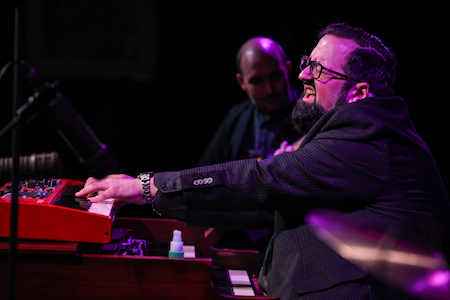 Joey DeFrancesco (photo: Kazimierz Jurewicz)
Joey DeFrancesco (photo: Kazimierz Jurewicz)Joey DeFrancesco, an astonishingly gifted multi-instrumentalist who as a teenager kickstarted a renaissance of the Hammond B-3 organ in jazz, died August 25 after a massive heart attack. He was 51.
Gloria DeFrancesco, his wife and manager, announced DeFrancesco’s death in an Instagram post on August 26. Location of death was not disclosed.
“The love of my life is now in peace with the angels,” she wrote. “Right now I have very few words. Thank you for the outpouring of love and support coming in from everywhere. Joey loved you all[.]”
A virtuoso on the organ, DeFrancesco was also a child prodigy, the son of another noted organist, Philadelphian “Papa” John DeFrancesco. The younger DeFrancesco began sitting in on his father’s gigs when he was five years old, started gigging in his own right at 10, signed his first record contract at 16, and toured with Miles Davis at 17.
As a player, he was renowned for his deep sense of groove and technique. While DeFrancesco did sculpt a certain style from his virtuosity, it was a difficult style to describe because of his vast knowledge and application of the entire jazz organ heritage. “Joey takes all styles and creates his own—the Joey DeFrancesco style,” percussionist Sammy Figueroa told Suzanne Lorge in 2020.
Long after his arrival had reignited interest in the organ for the 1980s “Young Lions” generation, DeFrancesco remained the preeminent organist in jazz. He was a five-time Grammy nominee. He won the DownBeat Readers Poll every year from 2005 to his death, and won the magazine’s critics’ poll nine times. When the Hammond Hall of Fame was founded in 2013, DeFrancesco was in its inaugural class of inductees. He was also the host of Organized, a weekly program of jazz organ, on SiriusXM’s Real Jazz channel.
In addition to the organ, DeFrancesco played trumpet and saxophone, and was also an occasional singer.
The outpouring of shock and grief at DeFrancesco’s sudden death on social media was tremendous. “Goodbye to my brother,” guitarist John McLaughlin tweeted. “We shared some of the greatest concerts of my life.”
“Am absolutely crushed,” drummer Peter Erskine added. “Easily the most swinging musician of our time.”
“He was one of the most loved, revered, and unique musicians of all time,” pianist Emmet Cohen, who had been scheduled to play back-to-back with DeFrancesco on August 27, wrote on Facebook. “We carry Joey’s spirit each and every time we hit the bandstand, and we’ll continue to keep his family and loved ones in our hearts and prayers.”
Joseph F. DeFrancesco was born April 10, 1971 in Springfield Township, Pennsylvania. When he was four years old, his organist father Papa John first showed him the Hammond B-3 organ. “I started playing it and the sound just moved me,” he told the Boston Herald. “Being a 4-year-old and making up your mind about what you want to do for the rest of your life—I was very fortunate.”
If his father soon put him on display, it wasn’t simply out of bias. By the time he was 10, DeFrancesco was good enough to play with Hank Mobley and Philly Joe Jones in Philadelphia. He was still a student at that city’s High School for the Creative and Performing Arts when Columbia Records offered him an exclusive recording contract.
Before he was able to make his first album, however, he had already recorded with Grover Washington Jr. (on 1987’s Strawberry Moon) and Miles Davis (1988’s Amandla), touring with the latter for six months after the trumpet legend shared billing with DeFrancesco on a local Philadelphia TV show. His own debut, All of Me, was issued in 1989.
From there, his rise was meteoric. He began touring with his own band shortly after graduating from high school; recorded four more albums for Columbia between 1989 and 1993; then recorded nearly three dozen more for the Muse, Big Mo, HighNote, Concord, and Mack Avenue labels. He enjoyed extended collaborations with Houston Person and John McLaughlin, and worked twice with his organ idol Jimmy Smith. He began playing trumpet after he was inspired by Davis; he often sang while playing organ, and in 2018 he began playing tenor saxophone as well. He played all of the above instruments, as well as piano and other keyboards, on his 2021 album More Music.
As shared on DeFrancesco’s Facebook page, he completed his final recording session on August 16. He had given his final live performance two days prior, during an August 12-14 weekend stand at Baltimore’s Keystone Korner.
In addition to his wife Gloria, DeFrancesco is survived by a daughter, Ashley; a son, Donny; his parents, John and Laurene; a sister, Cheryle; and a brother, John Jr.
Joey DeFrancesco Meets Pharaoh Sanders
Originally Published September 1, 2022



